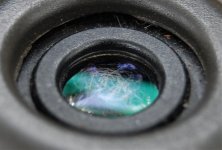I've recently used two different glasses which had extensive scratches on the oculars. The scratches appeared to mostly be from improper cleaning. The surprising thing is that I really couldn't detect any effect while viewing. In one case, one side is considerably worse than the other, yet the view appears the same. This seems to defy logic, especially when so much is said about coatings, etc.
What is the explanation of this? Is there a way to "test" the effect of lens scratches on the view?
Thanks, APS
What is the explanation of this? Is there a way to "test" the effect of lens scratches on the view?
Thanks, APS






